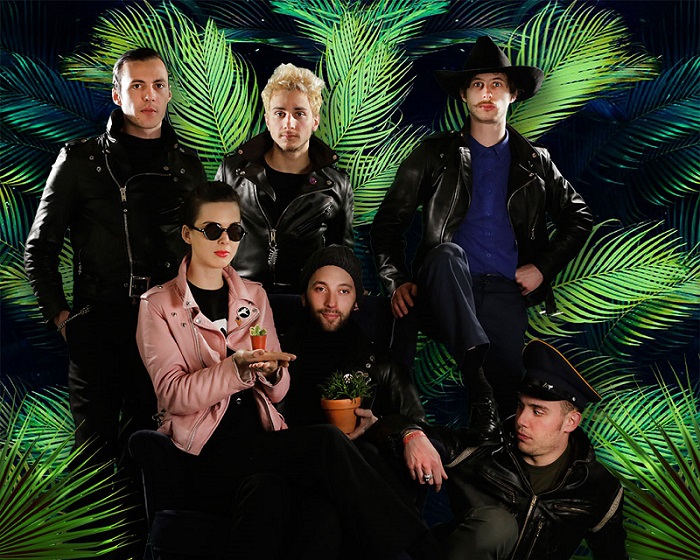La Femme combines French yé-yé with a 60s California vibe of psychedelic rock
I will always remember the first time I heard La Femme—it made me see music from another perspective. At the time, I was on exchange in Westfield, N.J., when a local student named Andrew said, “Do you know ‘La Femme’? They are really good. Give them a listen.” The disturbing yet fascinating melody of “Antitaxi,” which incorporates taxi honks and bus brakes with psychedelic pop sounds, played in the background as we rode to his house. Less than an hour later, Psycho Tropical Berlin, La Femme’s debut album, was already part of my playlist.
From the numerous genres they experiment with, to the lyrical topics they dive into, or from the cold-yet-sincere and eye-opening atmosphere they create musically, to their clothing style—ranging from three-piece tuxedos, to Sex Pistols torn jeans and leather jackets—La Femme is one of a kind. The group describes their music as limitless and without a specific style or distinct voice. Aside from their full-time lead female singer, the band features the singing voices of different women on many songs—according to their online biography. It’s a singularity that rapidly got me hooked.
La Femme is a sextet initially created by high school friends Marlon Magnée and Sacha Got in France’s Basque region—Europe’s surf capital. Magnée, who is on vocals and plays the synthesizer, moved to Paris, followed by Got. Back in 2010, La Femme began their journey in Paris, where they met the other bandmates: Noé Delmas, the drummer; Sam Lefèvre, the bassist; Lucas Nuñez Ritter, who plays the synth; and Clémence Quélennec, a vocalist.
La Femme’s genre may be undefinable, but elements of different styles are recurrent between La Femme’s Psycho Tropical Berlin and Mystère, their second and newest album. The group’s influences stem from California’s surf music and the 60s French yé-yé style, which reinterprets English songs in French. From one album to the next, the band has deepened their psychedelic and post-punk tones, evolving and adding to their style.
Over the past 15 years, French radio stations have been marked by a great amount of foreign music, mostly from the U.S. There were few French pop-rock bands that rose and stood out between the dominant French variety—which consists of songs with French-driven lyrics and poetic structure, or French rap. Yet, La Femme, with their distinct sounds, have stepped up in France, overseas and even have a presence in the U.S.
Their popularity has also risen due to the topics they write about, such as suicide, gender neutrality, psychedelic drugs, women, depression and the sometimes ugly realities of life. Their songs, written as short narratives, carry listeners through the life of a protagonist, usually a woman, making the listeners feel their despair or joy in raising awareness about social causes.

Here is a list of some of my personal favourite songs:
“Tueurs de fleurs” from Mystère
In “Tueurs de fleurs,” which translates to flower killers, La Femme touches on the sensitive subject of conjugal violence directed towards women, using the metaphor of women as flowers being poorly looked after or mistreated by their “owners.” In the end, the flowers grow strong in the dark and become carnivorous plants taking their revenge on their abusers.
“From Tchernobyl with love” from Psycho Tropical Berlin
In the form of a letter sent by a liquidator at the Chernobyl power plant to his family somewhere in past USSR, La Femme puts emphasis on the people directly exposed to the nuclear waste in the aftermath of the explosion. In the letter, the man, who tries to stay positive, describes his daily life as “a mission: destroy everything,” before saying the gamma rays are more important than his own flesh. The band uses a vintage synthesized voice resembling radio voices of the time, perfectly transporting the listener to that era.
“Si un jour” from Psycho Tropical Berlin
This song aims to break gender labels using the story of a woman living in France during the 50s and 60s. The protagonist enumerates simple fantasies, like smoking all day, wearing trousers, spitting or walking and whistling, which shape her gender-neutral identity. Yet, she is faced with people telling her to go back to sewing, to not play with the ball meant for boys and demanding she put her skirt back on. In the end, she trades in her Moulinex—a 60s kitchen utensil with the slogan “freeing the woman”—for a leather jacket and a Harley Davidson. Now she is ready to beat up anybody who criticizes her choices.
Special mentions
A special mention should go to “Mycose,” from Mystère, which explores the delicate subject of vaginal mycosis, commonly referred to as a vaginal yeast infection. In the song it affects a woman who wishes nothing but for it to go away. She departs from Earth to another planet in hope of the mycosis to go away. “Le Blues de Françoise,” from Psycho Tropical Berlin, touches the depression that can occur after a break-up. Finally, “Sphynx,” from Mystère, aims to spread the message that differences should not divide us. It uses the image of taking acid as a means to unify everybody under one universe during an mind-opening experience. La Femme will remain a mystery, and their music will keep on carrying me and other listeners to the rhythm of their uniqueness.




